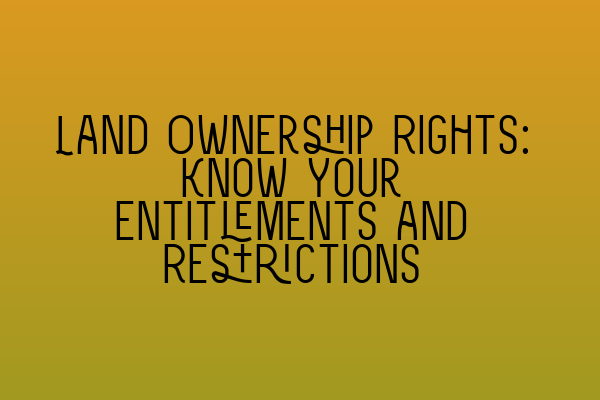Land Ownership Rights: Know Your Entitlements and Restrictions
As a property owner, understanding your land ownership rights is crucial. It gives you the confidence and knowledge to make informed decisions regarding the use and management of your property. This blog post aims to discuss the various entitlements and restrictions associated with land ownership, empowering you with the necessary information to navigate the complex world of property law.
1. Freehold Ownership – Your Key to Absolute Ownership
When you own a property freehold, or have a freehold title, you enjoy the highest level of ownership rights. It means you have absolute ownership of both the land and any structures built upon it. As a freehold owner, you have the freedom to use, modify, lease, sell, or pass on the property through inheritance without restrictions (subject to compliance with applicable laws and regulations).
2. Leasehold Ownership – Limited Ownership with Periodic Renewal
Leasehold ownership grants you the right to occupy and use a property for a fixed period of time. This form of ownership is often associated with lease agreements, commonly used for residential and commercial properties. Unlike freehold ownership, leasehold ownership comes with specific restrictions and limitations outlined in the lease agreement, such as paying rent, seeking permission for alterations, and adhering to lease stipulations. It’s essential to thoroughly review the terms and conditions of the lease before committing to a leasehold property.
3. Easements – Rights and Access to Shared Spaces
Easements refer to the rights and privileges granted to individuals or entities to access or use parts of another person’s land. Common examples include shared driveways, footpaths, or utility access. Easements ensure that rights are protected and that the usage is regulated, preventing conflicts between landowners. Understanding the existence and implications of easements is crucial when considering land purchase or development plans.
4. Covenants – Restrictions Imposed for Preservation
Covenants are legal restrictions placed on a property to ensure the preservation or maintenance of specific features or aesthetics. They are commonly found in residential developments, where homeowners’ associations establish guidelines and limitations to maintain uniformity and protect property values. Covenants can restrict activities such as external modifications, construction types, or land usage. It’s essential to review and understand any covenants that may affect your property rights before making a purchase.
5. Planning Permissions and Zoning – Guiding Development
Before undertaking any development or modification on your property, it is crucial to obtain the necessary planning permissions and adhere to zoning regulations. Planning permissions regulate the use and development of land to protect the environment, maintain architectural integrity, and ensure adequate infrastructure. Zoning regulations, on the other hand, restrict the type of use (e.g., residential, commercial, industrial) allowable in specific areas. Obtaining the appropriate permissions and adhering to zoning regulations is vital to avoid legal complications and potential fines.
6. Adverse Possession – Understanding Boundaries and Tenure
Adverse possession is a legal concept that allows individuals to claim ownership rights to land they have occupied, used, and maintained without permission from the true owner. While it may seem puzzling, adverse possession aims to prevent land from becoming abandoned or neglected. Understanding adverse possession laws in your jurisdiction is crucial to protect your land from potential claims and to navigate any disputes that may arise.
7. Boundaries and Encroachments – Knowing What’s Yours
Determining the boundaries of your property is essential to avoid conflicts with neighboring landowners. Property surveys can provide accurate boundary markers, preventing potential disputes and encroachments. Encroachments occur when a structure, fence, or other elements extend beyond your property line onto neighboring land or vice versa. Resolving boundary and encroachment issues requires understanding the relevant laws and, if necessary, seeking legal advice.
Conclusion
Knowing your entitlements and restrictions as a landowner is paramount to protect your property rights and avoid legal disputes. Whether you hold a freehold or leasehold title, understanding easements, covenants, planning permissions, adverse possession, and boundaries will empower you to make informed decisions and navigate the intricacies of property law. Always consult legal professionals when in doubt or when facing complex land ownership issues.
At SQE Property Law & Land Law, our team of experienced solicitors is ready to assist you with any land ownership matters and provide expert guidance tailored to your specific circumstances. Feel free to reach out to us for professional support in safeguarding and exercising your land ownership rights.
